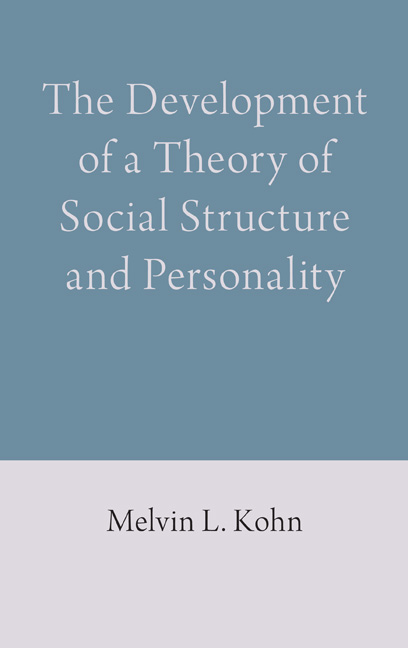Book contents
- Frontmatter
- Contents
- Preface
- 1 Hagerstown and Schizophrenia
- 2 Social Stratification and Parent–Child Relations in Washington, DC
- 3 The Torino Study
- 4 Men Employed in Civilian Occupations in the United States
- 5 The Transformation of the Occupations Study into a Longitudinal Analysis
- 6 Life on Sabbatical Leave in Norway and at the National Institute of Mental Health
- 7 Class, Stratification, and Personality
- 8 Poland under Communism
- 9 Occupational Self-Direction and Distress in Poland
- 10 The Vietnam War, Nixon, and Me
- 11 Japan
- 12 Germany – West and East
- 13 Poland and Ukraine in Transition to Capitalism and Democracy
- 14 The Presidency of the American Sociological Association, Ronald Reagan, and My Job Switch
- 15 My Two Exploratory Expeditions to China
- 16 China in Transition to a Modern Economy
- 17 Retirement, and My Last Sabbatical, at Deep Springs Junior College
- 18 The Theory I Propose
- Index
16 - China in Transition to a Modern Economy
Published online by Cambridge University Press: 12 July 2019
- Frontmatter
- Contents
- Preface
- 1 Hagerstown and Schizophrenia
- 2 Social Stratification and Parent–Child Relations in Washington, DC
- 3 The Torino Study
- 4 Men Employed in Civilian Occupations in the United States
- 5 The Transformation of the Occupations Study into a Longitudinal Analysis
- 6 Life on Sabbatical Leave in Norway and at the National Institute of Mental Health
- 7 Class, Stratification, and Personality
- 8 Poland under Communism
- 9 Occupational Self-Direction and Distress in Poland
- 10 The Vietnam War, Nixon, and Me
- 11 Japan
- 12 Germany – West and East
- 13 Poland and Ukraine in Transition to Capitalism and Democracy
- 14 The Presidency of the American Sociological Association, Ronald Reagan, and My Job Switch
- 15 My Two Exploratory Expeditions to China
- 16 China in Transition to a Modern Economy
- 17 Retirement, and My Last Sabbatical, at Deep Springs Junior College
- 18 The Theory I Propose
- Index
Summary
Weidong's and my study was about social structure and personality during the privatization of urban China. It was designed to test the generality of the findings and interpretation of the relationships between position in the social structure and personality that had initially been developed in the US studies, particularly the large-scale study of employed men conducted in 1964, and extended to the study of employed men in socialist Poland. This study was further extended to employed Japanese men, to the wives of the men in all three countries, and subsequently to the study of both men and women, whether or not employed, in both Poland and Ukraine during the early stages of their transition from socialism to nascent capitalism. All these studies consistently showed that position in the class structure and in the stratification hierarchy were closely linked to such fundamental dimensions of personality as intellectual flexibility, self-directedness of orientation, and, with the exception of socialist Poland, a sense of distress.
Moreover, the explanation of these relationships between social structure and personality was much the same at all the times and for all the nationalities studied. Position in the class structure and in the stratification hierarchy was highly correlated with job conditions that facilitate or constrain the exercise of self-direction in one's work – notably the substantive complexity of the work, how closely it is supervised, and how routinized it is. These job conditions, in turn, affect and are affected by intellectual flexibility, self-directedness of orientation, and, except for Poland when it was socialist, a sense of well-being or distress. That exception marked the one major cross-national difference between the capitalist United States and socialist Poland. Managers in the United States were among the least distressed among all social classes, while managers in Poland, particularly those who were not members of the Communist Party, were among the most distressed. And manual workers in the United States were the most distressed social class, but in Poland were the least distressed. The Polish–US differences appeared to be largely a function of differences in the conditions of job and life experienced by Polish and US managers, and by Polish and US manual workers. Herein, we thought, was a major clue as to the limits of our theory.
- Type
- Chapter
- Information
- Publisher: Anthem PressPrint publication year: 2019

